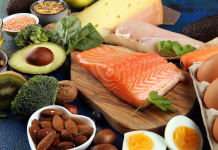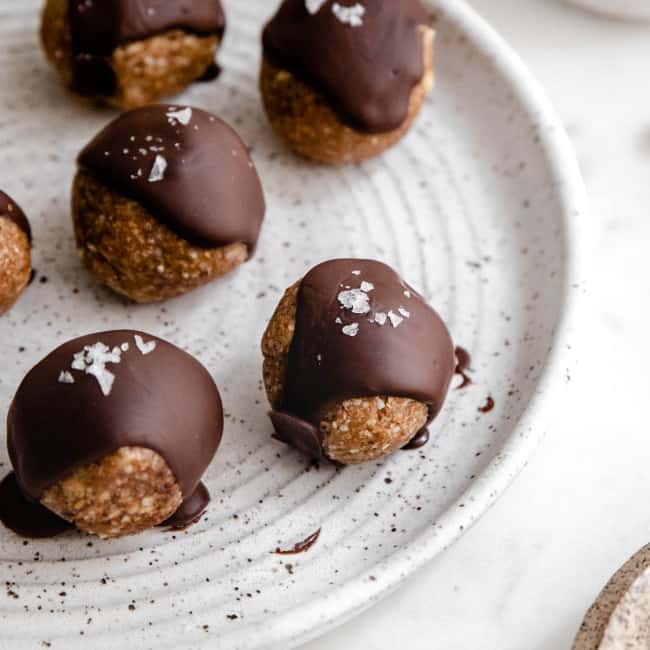Should you eat something before bed if you have diabetes? What kind of snack, if any, should you have? Experts dish out the answers below.
If you’re a smart sleeper, you’ve established a pre-bed routine to get your mind and body ready for slumber.
Perhaps you read a book, take a bath, spend time with your cat, or do all of the above. However, you may be wondering if you should incorporate a snack into that regimen if you have diabetes.
As you might expect, although some diabetics might benefit from a snack, others might not. So how do you know? And what snacks are best for you? Check out the advice from nutrition specialists.
Why Snacking Before Sleeping Makes Sense
There might be a solid argument for eating a snack before bed, regardless of whether you have type 1 or type 2 diabetes. “It can help prevent blood sugar levels from falling too low at night and/or rising too high in the morning,” explains Haute & Healthy Living founder Elysia Cartlidge, RD, a registered dietitian in Ontario, Canada.
It goes without saying that both high and low blood sugar levels can have negative long-term impacts on the body, so it’s best to avoid both.
That bedtime snack could also aid your sleep. A modest, well-balanced snack will help prevent you from becoming hungry and waking up in the middle of the night, which could have worse outcomes.
According to Cartlidge, “getting too little sleep can interfere with the hormones that control appetite,” which makes you more likely to overeat when you’re up. That may result in problems controlling blood sugar and weight.
Additionally, getting too little sleep makes you produce more stress hormones, which might raise your blood sugar levels. The reason it becomes a vicious cycle is because high blood sugar causes your kidneys to overcompensate by making you urinate more frequently, which can lead to even more disrupted sleep, according to Cartlidge. Furthermore, you may even find it difficult to fall asleep due to the headaches, increased thirst, and fatigue that high blood sugar can bring on.
How to Assess Whether You Require a Snack at Night
Not every diabetic has to eat anything before going to bed.So how do you know? Follow the advice of your blood sugar levels.
 Cartlidge advises keeping track of and recording your blood sugar levels at several times of the day, such as right before bed, in the early hours of the morning, and upon waking. After obtaining such readings, you can discuss whether you require an evening snack with your healthcare physician.
Cartlidge advises keeping track of and recording your blood sugar levels at several times of the day, such as right before bed, in the early hours of the morning, and upon waking. After obtaining such readings, you can discuss whether you require an evening snack with your healthcare physician.
There is, though, a condition that should be taken into account. This situation, which causes your blood sugar levels to rise in the morning as a part of the waking up process, is called the dawn phenomenon.
“Because you’ll have high blood sugar levels in the morning, it may be recommended that you avoid eating a carbohydrate-rich snack before bed, as it could cause blood sugar levels to rise,” Cartlidge says. The dawn phenomenon’s impacts might get worse if that keeps up.
6 Bedtime Snacks for People with Diabetes
There are a few things to think about if you and your healthcare professional have determined that having a snack before bed is a good choice.
First, schedule your snack for approximately half an hour before going to bed in order to aid with digestion, advises Long Beach, California-based registered dietitian Amanda Sauceda, M.S., RD. Of course, depending on your blood sugar level, you might need to modify this.
Then make sure you’re not eating what Sauceda calls a “naked” carb, essentially a carbohydrate by itself. The ideal combination for that type of carb would be one that contains fiber, or a complex carb, along with a healthy fat and protein.
According to Sauceda, “by stabilizing blood sugars, this nutrient combo will prevent a big blood sugar spike.”
Finally, remember that this is a snack, not a meal. Keep an eye on your total calorie consumption and portion sizes.
“If you eat too large of a snack, it could cause elevated blood sugar and long-term weight gain,” Cartlidge says.
Here are six snacks that meet with our dietitians’ approval:
Avocado on Whole-Wheat Toast
Love avo toast? Then this snack’s for you, as avocado is a fruit that’s naturally high in fiber and full of healthy fats that are good for your heart and your blood sugar, Sauceda says.
It’s even better when mashed on top of whole-wheat bread, or any other high-fiber bread of your choice. A 2022 study that was published in Nutrients found that whole grains have a beneficial influence on blood sugar.
Whole-Grain Bread with Natural Peanut Butter
Here’s another snack idea with whole-grain bread, either toasted or as is. Just make sure you’re using 100% whole-grain bread—look for “whole grain” to be the first ingredient on the list—that has at least 2 grams of fiber per slice, Cartlidge says.
Limit your calorie intake by only eating one slice and top it with natural peanut butter that hasn’t had any sugar or salt added.Cartilage continues,”Peanut butter can help slow the digestion of carbohydrates and stave off nighttime hunger because it is rich in healthy fats and protein.”Magnesium is one of the many nutrients found in peanut butter, and it helps control blood sugar.
Energy Bites
The next time you’re making energy bites, use a nut-butter base. According to Sauceda, multiple studies have connected nuts to decreased fasting blood sugar and improved blood sugar control.
Nuts also contain protein, fat, and fiber. Use a scoop of protein powder or higher protein nuts, such as almonds or peanuts, to increase the protein level of your energy bits.
For some plant-based omega-3s, mix in some ground flax or chia seeds. They’re also anti-inflammatory, and it’s being researched whether treating inflammation can help with metabolic syndrome and diabetes.
Greek Yogurt with Berries
Greek yogurt gets a thumbs-up from Cartilage, who says that it’s a wise choice for people with diabetes, as it can contain up to twice the protein yet only half the carbohydrates as regular yogurt.
Yogurt also has numerous health advantages, such as improved heart and digestive health. Just be careful to stick to plain yogurt—flavored varieties frequently have a lot of extra sugar, which can cause a blood sugar surge.
It’s okay to switch to Greek or plant-based yogurt if necessary or desired. Add some berries, such blueberries or blackberries, to the yogurt to make it sweeter. “They won’t cause as much of a spike in blood sugar because they’re lower on the glycemic index than other types of fruit,” remarks Cartlidge.
A 2021 study published in the International Journal for Vitamin and Nutrition Research found that berries are high in anthocyanins, antioxidants that may hinder specific digestive enzymes that can slow down digestion, in addition to their high fiber content.
Hummus with Veggies or Fruit
Legumes such as chickpeas, which are a plant-based source of protein and have special benefits for diabetics, are used to make hummus.”Studies suggest that legumes such as chickpeas may aid in enhancing insulin sensitivity,”Sauceda states, citing a 2018 investigation that was released in the journal Nutrients. To obtain extra fiber, pair it with veggies like celery and carrots.
Whole-Grain Crackers and Cheese
Recall that whole grains are high in fiber, which lowers the risk of significant blood sugar rises. Then why cheese? It has some fat, protein, and very little to no carbs, but more significantly, according to Cartlidge, “the fat and protein can also help you feel full for longer, thus reducing cravings for less-healthy foods.
“And a word of caution for those who are lactose sensitive or on a vegan diet: Plant-based cheese can be substituted, although Cartlidge notes that the protein level will be slightly lower—roughly 1 to 2 grams in a slice of vegan cheese compared to about 4 grams in a piece of normal cheese.


























